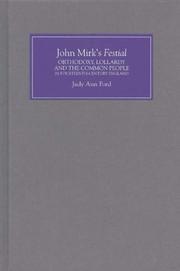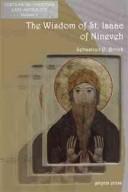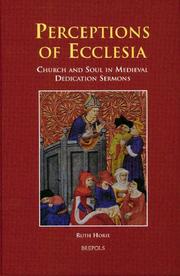| Listing 1 - 4 of 4 |
Sort by
|

ISBN: 1282079999 9786612079993 1846154804 1843840014 Year: 2006 Publisher: Cambridge : D.S. Brewer,
Abstract | Keywords | Export | Availability | Bookmark
 Loading...
Loading...Choose an application
- Reference Manager
- EndNote
- RefWorks (Direct export to RefWorks)
'Marvellously perceptive and insightful'. FIONA SOMERSET, Duke University. Written with largely uneducated rural congregations in mind, John Mirk's Festial became the most popular vernacular sermon collection of late-medieval England, yet until relatively recently it has been neglected by scholars -- despite the fact that the question of popular access to the Bible, undoubtedly regarded as the preserve of learned culture, along with the related issue of the relative authority of written text and tradition, is at the heart of both late-medieval heresy and the resultant reformulation of orthodoxy. It offers, in fact, an unparalleled opportunity to analyze the religious ideology communicated by the orthodox church to the vast majority of people in fourteenth-century England: the ordinary country folk. This book represents the first major examination of the Festial, looking in particular at the issues of popular culture and piety; the oral tradition; biblical and secular authority; and clerical power.
JUDY ANN FORD is Associate Professor in the History Department of Texas A&M University-Commerce.
Sermons, Medieval --- Lollards. --- Poor priests --- Wiclifites --- Wyclifites --- Mirk, John, --- England --- Church history

ISBN: 1593333358 9781593333355 Year: 2006 Publisher: Piscataway, NJ Gorgias press
Abstract | Keywords | Export | Availability | Bookmark
 Loading...
Loading...Choose an application
- Reference Manager
- EndNote
- RefWorks (Direct export to RefWorks)
From one of the most thought-provoking writers in the monastic tradition, this volume contains 153 short, contemplative sayings of St. Isaac of Nineveh (fl. 661-681 CE) in their original Syriac with facing English translation. St. Isaac was ordained bishop of Nineveh but resigned his post only five months later and became a monastic hermit in the mountains of southeastern Iraq. This work speaks to believing Christians today as well as scholars wishing to learn more about the Eastern monastic tradition.
Mysticism --- Asceticism --- Spiritual life --- Sermons, Medieval. --- Syriac language --- Mysticisme --- Ascétisme --- Vie spirituelle --- Sermons médiévaux. --- Syriaque (Langue) --- Church of the East. --- Christianity --- Église nestorienne. --- Christianisme --- Isaac, --- Sermons, Medieval --- 276 =923 EPHRAEM SYRUS --- Church of the East --- Syrische patrologie--EPHRAEM SYRUS --- Medieval sermons

ISBN: 2503520596 9782503520599 Year: 2006 Volume: 2 Publisher: Turnhout Brepols
Abstract | Keywords | Export | Availability | Bookmark
 Loading...
Loading...Choose an application
- Reference Manager
- EndNote
- RefWorks (Direct export to RefWorks)
Christian church history --- Christian pastoral theology --- anno 500-1499 --- Church --- Church dedication sermons --- Ecclesiastical theology --- Ecclesiologie --- Ecclesiology --- Ecclésiologie --- Eglise --- Kerk --- Kerk [Leer over de ] --- Leer over de Kerk --- Theology [Ecclesiastical ] --- Church dedication --- Sermons, Medieval. --- Church history --- Preaching --- Eglises --- Sermons médiévaux --- Prédication --- History --- Dédicace --- Histoire --- 251 "04/14" --- Homiletiek. Verkondiging. Prediking:--middeleeuwen --- Church dedication. --- Sermons, Medieval --- History of Doctrines --- History and criticism. --- 251 "04/14" Homiletiek. Verkondiging. Prediking:--middeleeuwen --- Sermons médiévaux --- Prédication --- Dédicace --- Theology, Ecclesiastical --- People of God --- Theology --- Consecration of churches --- Dedication of churches --- Dedication services --- Rites and ceremonies --- History and criticism --- Soul --- Christianity --- Sermons [Medieval ] --- Middle Ages, 600-1500 --- Middle Ages, 500-1500 --- Medieval sermons
Multi
ISSN: 0590451X ISBN: 9783790215922 3790215929 3790215910 9783790215915 Year: 2006 Volume: 30-31 Publisher: Trier Paulinus
Abstract | Keywords | Export | Availability | Bookmark
 Loading...
Loading...Choose an application
- Reference Manager
- EndNote
- RefWorks (Direct export to RefWorks)
The present volume presents papers from the first of two international symposia focused on the sermons of Nicholas of Cusa (1401-1464).The complete 293 sermons are now available in edited, printed form in Vois. XVI-XIX of the series Ntcolat de Cusa Opera Omnta (Hamburg: Felix Meiner, 1970-2006). To anyone who is studying Nicholas' thought the sermons are an essential resource, constituting, as they do, approximately one-third of his writings. Some of the sermons were put into written form after they were preached; some were written down before they were preached; and some were preached without ever being written down.The 293 sermons of which we are in possession are more correctly referred to as sermon-sketches-some of which are lengthy sketches, others of which are quite short. Although aE of the sermons except for two (viz., XXIV and LXXVI) are written in Latin, most of them were preached in German. As a result, the written sermons give us only thematic impressions of what Nicholas actually preached more or less extemporaneously. There can be no doubt that at times he also preached in Latin, especially when preaching in Rome and when preaching to priests. In preaching to the latter, his sermons were, presumably oftentimes macaronic. Moreover, the German Sermon LXXVI, unlike Sermon XXIV, is not from the hand of Nicholas himself; rather, it is the report of a hearer in Vienna, where it was preached. By contrast with Cusanus, Meister Eckhart wrote some 243 sermons (fifty less than did Cusanus). Over half of them (140 in number) were in German, whereas the others (103 in number) were in Latin. But what is it that explains why Nicholas wrote only one Sermon in German but preached most of them in German? How long, typically, did a sermon, as preached, last? Have there survived manuscripts (of the sermons) written in Nicholas's own hand? Is there evidence that Nicholas was an effective preacher, an interesting preacher? How highly philosophical and theological are his sermons? How extensive is his use, in the sermons, of dramatization, parable, anecdote? How rich and how novel are his metaphors? What sources does he cite? What themes seem to be the most prominent? These and other questions are raised-and answered (in some cases decisively, in other cases tentatively)in the present collection of symposium papers.Thus, as in the first paragraph above, the papers furnish us with a wealth of knowledge about the background context, the thematic contents, and the varied forms of Nicholas's Predtgten.Accordingly, the volume is to be highly recommended to medieval and Renaissance scholars.
Christian pastoral theology --- Nicholas of Cusa --- Philosophy --- Theology --- Sermons, Medieval --- Preaching --- 27 <05> --- 2 NICOLAUS CUSANUS --- 2 NICOLAUS CUSANUS Godsdienst. Theologie--NICOLAUS CUSANUS --- Godsdienst. Theologie--NICOLAUS CUSANUS --- Kerkgeschiedenis--Tijdschriften --- Annual reports
| Listing 1 - 4 of 4 |
Sort by
|

 Search
Search Feedback
Feedback About
About Help
Help News
News